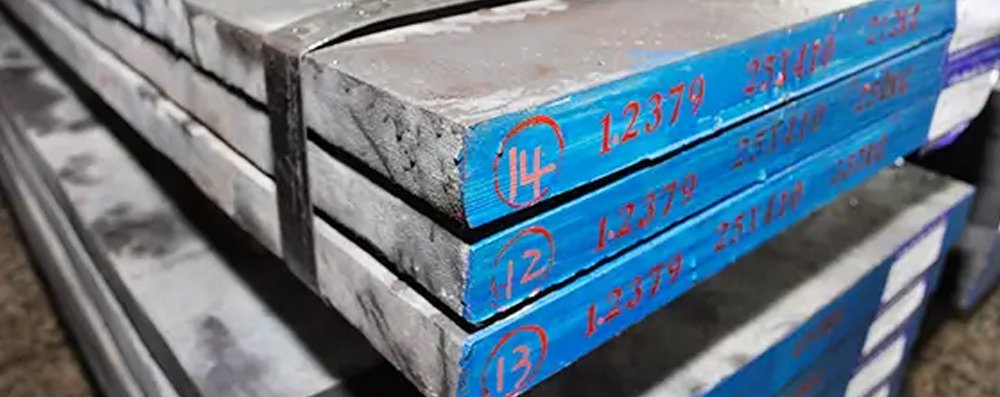Introduction
DIN 1.2379 (AISI D2) is a high-carbon, high-chromium cold work tool steel renowned for its exceptional hardness, excellent wear resistance, and good dimensional stability after heat treatment. Due to its high volume of chromium carbides in the microstructure, DIN 1.2379 offers superior resistance to abrasion, making it highly suitable for demanding cold work applications involving wear and deformation resistance.
Properties of the Grade:
- Exceptional wear resistance
- High hardness (up to 62 HRC after heat treatment)
- Excellent dimensional stability
- Good compressive strength
- Good toughness relative to other high-carbon tool steels
- Good through-hardening properties
- Moderate corrosion resistance in hardened condition
- Air or oil hardening capability
Uses/Applications:
DIN 1.2379 tool steel is widely utilized in high-performance cold work applications requiring excellent abrasion resistance:
- Blanking and punching dies
- Forming dies
- Drawing dies
- Industrial knives
- Shear blades
- Thread rolling dies
- Extrusion dies
- Plastic molds requiring high wear resistance
- Wear parts
- Coining tools
- Embossing dies
Chemical Composition:
| Element | Content (%) |
| Carbon (C) | 1.50 – 1.60 |
| Chromium (Cr) | 11.00 – 13.00 |
| Vanadium (V) | 0.70 – 1.00 |
| Molybdenum (Mo) | 0.70 – 1.00 |
| Manganese (Mn) | 0.20 – 0.60 |
| Silicon (Si) | 0.10 – 0.60 |
| Phosphorus (P) | ≤ 0.030 |
| Sulfur (S) | ≤ 0.030 |
Mechanical Properties:
(Typical values after heat treatment)
| Property | Typical Value |
| Hardness (Annealed) | ~ 220 – 250 HB |
| Hardness (Hardened) | 58 – 62 HRC |
| Tensile Strength | ~ 1900 MPa |
| Yield Strength | ~ 1600 MPa |
| Elongation | ~ 5% |
| Impact Resistance | Moderate |
The combination of high carbon, chromium, vanadium, and molybdenum ensures outstanding hardness, wear resistance, and toughness.
Physical Properties:
| Property | Typical Value |
| Density | ~ 7.7 g/cm³ |
| Modulus of Elasticity (E) | ~ 210 GPa |
| Thermal Conductivity | ~ 20 W/m·K |
| Specific Heat Capacity | ~ 460 J/kg·K |
| Coefficient of Thermal Expansion | ~ 10.4 × 10⁻⁶ /°C |
Forging:
Forging Temperature Range: 950°C – 1100°C
Procedure:
- Preheat slowly and uniformly.
- Begin forging at 1100°C and do not forge below 950°C.
- After forging, cool slowly in a furnace or sand to prevent cracking.
- Always perform annealing after forging to relieve stresses.
Heat Treatment:
- Annealing:
- Heat slowly to 850°C – 900°C.
- Hold at temperature for 2-4 hours.
- Furnace cool slowly to ~600°C, then air cool.
- Resulting hardness: ~ 220 – 250 HB.
- Stress Relieving:
- After heavy machining, heat to ~600°C – 650°C.
- Hold for 2 hours and cool in still air.
- Hardening:
- Preheat to 800°C – 850°C.
- Austenitize at 1020°C – 1040°C.
- Quench in air or oil, depending on the size and complexity.
- Tempering:
- Double tempering is recommended.
- Temper between 150°C and 500°C depending on the desired hardness.
- Tempering above 550°C reduces hardness significantly.
Dimensional Tolerances:
- Available in hot rolled, forged, precision ground, and bright drawn forms.
- Typical tolerances for ground bars follow ISO h9 or tighter on request.
- Custom tolerances for tool making applications can be provided.
Machinability:
- Machinability is moderate to difficult due to high carbon and chromium contents.
- Best performed in the annealed condition.
- Requires carbide or coated tools.
- Lower cutting speeds and proper cooling/lubrication recommended to avoid tool wear.
Corrosion Resistance:
- DIN 1.2379 offers moderate corrosion resistance in the hardened and tempered condition.
- Not suitable for highly corrosive or wet environments without additional protection.
- Ideal for dry working conditions where corrosion is not a primary concern.
Weldability:
- Welding is challenging due to high carbon content leading to risk of cracking.
- Preheat at 250°C – 350°C.
- Post-weld heat treatment (annealing) is mandatory to relieve stresses.
- Specialized welding electrodes for tool steels are recommended.
Available Form:
DIN 1.2379 steel is available in a variety of forms to cater to different manufacturing needs:
- Round Bars
- Flat Bars
- Square Bars
- Plates
- Forged Blocks
- Precision Ground Bars
Material is supplied in annealed, hardened, or tempered condition based on customer requirements.
Conclusion:
DIN 1.2379 (AISI D2) is an outstanding cold work tool steel offering exceptional hardness, abrasion resistance, and dimensional stability. Its mechanical and physical properties make it highly suitable for cutting, blanking, and forming operations requiring high performance and durability. Proper heat treatment, careful machining, and protective measures against corrosion will significantly enhance the tool life and overall performance in industrial
Related Products : D2, DB6, DIN 1.2714, DIN 1.2080, DIN 1.2379, DIN 1.2343, DIN 1.2344, EN31, H11, H13, OHNS, HCHCR, M2, P20+S, P20, P20+Ni, K310, Maps


